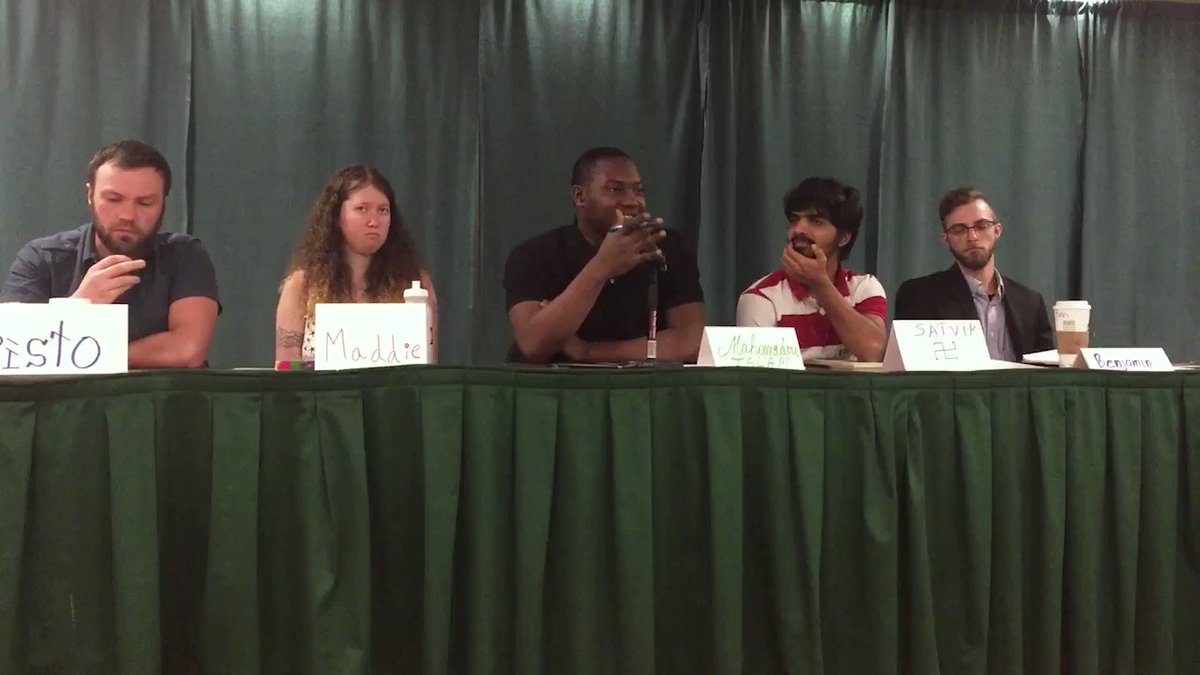Portland State University’s campus newspaper, The
Vanguard, has fired an editor following his coverage of
an interfaith conference. The paper accused journalist
Andy Ngo of endangering a student’s life after he tweeted
out a video of the panel, which featured the Muslim
student saying that apostasy and atheism must be
punishable by death.

The unnamed Muslim student speaker took a question from the audience, who asked him if the religion permitted killing atheists and apostates for their religious views. The panelist responded in the affirmative, stating that
under “Quranic law,” being a non-believer is considered
criminal in countries that impose it.
He added: “So in that case, you are given the liberty to
leave the country. I am not going to sugarcoat it. So if
you go to a different country…but in a Muslim country,
a country based on Quranic law, disbelieving or being
an infidel, is not allowed, so you will be given the choice.”
In other words, apostates and atheists can either choose
to leave or suffer the consequences where such strict
interpretations of the law are imposed.
Ngo posted an extended clip of the exchange shortly
after, to provide full context for the discussion. Regardless, The Vanguard claims the
video is being shared “widely out of context.”
Describing it as a “misunderstanding gone viral,”
the campus paper repudiated Ngo for sharing the
video and blamed his tweets for becoming a topic of
discussion on “right-leaning media outlets.” Breitbart
published coverage of the event with Ngo’s tweets
several days before The Vanguard covered it, apparently
as a response to the dust it kicked up.
The Vanguard says that the Muslim student “had a
feeling
he may have misspoke,” and that he was now “concerned
for his safety and for how the misinterpretation and
misrepresentation could affect his family and community.”
Benjamin Ramey, a secular humanist who represented
the Freethinkers of PSU at the panel, disagrees with
The Vanguard’s assessment.
“As one of the panelists present at this event I would like
to say that this speech is not taken out of context,”
Ramey said on Twitter.
PSU Assistant Professor of Philosophy Peter Boghossian
weighed in on the conversation and said: ““The same
people who want to punch ‘Nazis’ are completely silent
when it comes to certain people advocating mass murder.”
In National Review, Ngo says that The Vanguard editor-in
-chief Colleen Leary called him into a meeting with
managing editor Tim Sullivan, and newspaper advisor
Reaz Mahmood. The team admonished him for sharing
the unedited video clip on social media.
Despite never sharing the Muslim panelist’s name, he
was fired for supposedly “endangering” the student’s life
with a report that inconvenienced the student paper. Ngo
writes:
My editor [Leary], whom I deeply respected at the time,
called me “predatory” and “reckless,” telling me I had put
the life and well-being of the Muslim student and his
family at risk. She said that my tweets implied the
student advocated the killing of atheists. Another
person [Mahmood] in the meeting said I should have
taken into account the plight of victimized groups in
the “current political climate.” The editor claimed I
had “violated the paper’s ethical standards” by
not “minimizing harm” toward the speaker.
The Vanguard’s coverage of the event and the
ensuing fallout states that the paper is “committed to
minimizing harm,” and abiding by the Society of
Professional Journalists’ Code of Ethics, as if Ngo had
personally violated them by sharing unedited footage
of the panel exchange. It calls the event’s coverage on
“markedly biased media outlets” a “type of dangerous
misrepresentation.”
Ironically, The Vanguard’s efforts to censure Ngo to
preserve a narrative is precisely everything the SPJ’s
Code of Ethics is designed to safeguard against.
I asked Andy Ngo what he thought whether Mahmood
intended for him to censor himself with the comment on
taking the plight of victimized groups “in the current
political climate” into account. Ngo says:
“As you know, those who work in media never use
the word ‘censor’ even if that is what they mean in
practice. The media adviser said I should have known
better than to share the video of the Muslim panelist
since I attended a mandatory training session on
social justice in the media.At the training, we were taught to always consider
which groups of people are ‘privileged’ and which
are ‘oppressed’ in our work as leaders of student
media. Non-Christians were defined as targets of
oppression.I transgressed by treating the Muslim panelist the
same way I’ve treated others in my multimedia tweets.”
Given the outcome of Ngo’s coverage of the panel, I
asked him what he thought of the enforcement of
“acceptable narratives” in the media, and its effects
on journalism.
“The perpetuation of ‘acceptable narratives’ in journalism
weakens media as a whole,” Ngo says. “It is a media
sickness that affects all political slants and biases. It gives
too much power to the few decision-makers at the top to
determine what truths people can or should know.”
“It’s no secret that the American public are highly
distrustful of news media,” he added. “An unfortunate
outcome is that many are turning to only social media
instead, where disinformation runs rampant. It’s time we
start valuing truth and accuracy over ideology and
narrative.”
Ian Miles Cheong is a journalist and outspoken media critic. You can reach him through social media at @stillgray on Twitter and on Facebook.



No comments:
Post a Comment
Thanks for commenting. Your comments are needed for helping to improve the discussion.